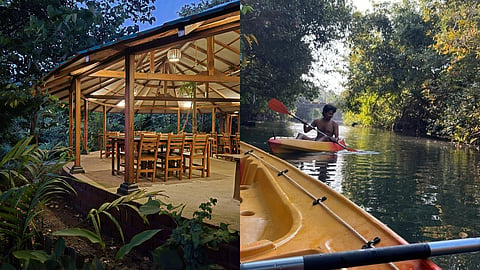
- HOMEGROWN WORLD
- #HGCREATORS
- #HGEXPLORE
- #HGVOICES
- #HGSHOP
- CAREERS
- ABOUT US
- CONTACT US

The rise of the Konkan coast as a popular weekend destination has led to overcrowding and ecological pressure. Raan Guhagar, an eco-backpacker hostel, is pioneering an alternative approach — one that is reshaping tourism by centring community awareness, conservation, and mindful living.
Over the past decade, the Konkan coast has steadily transformed from a stretch of fishing hamlets and sleepy coconut groves into one of Maharashtra’s most sought-after weekend getaways. From Alibaug to Dapoli, the shoreline is now dotted with boutique villas, infinity pools, and beach clubs catering to city dwellers seeking a quick fix of tranquillity. But this surge in short-term tourism has come at the cost of vanishing mangroves, mounting waste, and an eroding sense of local community. Raan Guhagar, a forest-side eco-backpacker hostel near the town of Guhagar, in the Ratnagiri district, stands out as a radical alternative that redefines slow, mindful travel in the Konkan coast.
‘Raan’ in Marathi means ‘wild’ — a word that has long carried an unfair connotation of being uncivilised or untamed. But here, the wilderness is not something to be fenced off or conquered; it is something to live within and learn from. Set along a river and surrounded by dense coastal forest, the property invites visitors to slow down and reconnect through mindful coexistence with the wild and within the wilderness.
For city travellers accustomed to “curated experiences” and instant gratification, this encourages a process of conscious unlearning. But the goal here isn’t asceticism, but awareness — to see leisure as a mindful act of being present instead of passive consumption.
The philosophy behind Raan is simple but subversive in today’s hyper-consumerist travel culture: stay longer, move slower, and leave lighter footprints. Unlike typical weekend villas or beach resorts, Raan rejects indulgence in favour of immersion.
In doing so, Raan challenges the extractive model of tourism that has become dominant along Maharashtra’s Konkan coast. The post-pandemic rise in “quick escapes” has led to a crisis of over-tourism: soaring prices, pressure on fragile ecosystems, and cultural dilution in once self-sufficient farming and fishing communities. As a result, local economies have become reliant on short-term tourist demand rather than long-term resilience.
Raan’s model is based on reciprocity. It employs village women, sources locally, and promotes knowledge exchange — from traditional farming methods to understanding the delicate biodiversity of the Konkan. Its audience, too, reflects a shift in travel sensibilities. Raan is designed for solo travellers, artists, backpackers, and remote workers who prefer longer, immersive stays rooted in local cultures. Guests stay in dorms and stone cottages, eat homely Konkan meals cooked by local women, and explore the land through hiking trails, woodland waterbodies, and mangrove walks. Alcohol, smoking, and loud music are prohibited; instead, guests are encouraged to share stories, play instruments, or simply listen to the forest’s wild soundscape. Children and large groups are not allowed, preserving an atmosphere of calm ideal for solo travellers and small groups seeking introspection or creative recharge.
Beyond its rustic charm, Raan’s ethos extends to the revival of traditional knowledge and local livelihoods. By engaging the nearby village through food, maintenance, and guided experiences, the hostel fosters a small but significant model of ecotourism: one rooted in respect, reciprocity, and regeneration.
If you enjoyed reading this, here’s more from Homegrown:
Van Bhoj: Stay At A One-Of-A-Kind Luxury Eco-Retreat Mud House In Delhi NCR
Enjoy Authentic, Eco-Conscious Travel At An Experiential Nature Stay In Wayanad, Kerala
'Walden' Is An Experiential Farm Stay Inspired By Henry David Thoreau's Naturalist Values
